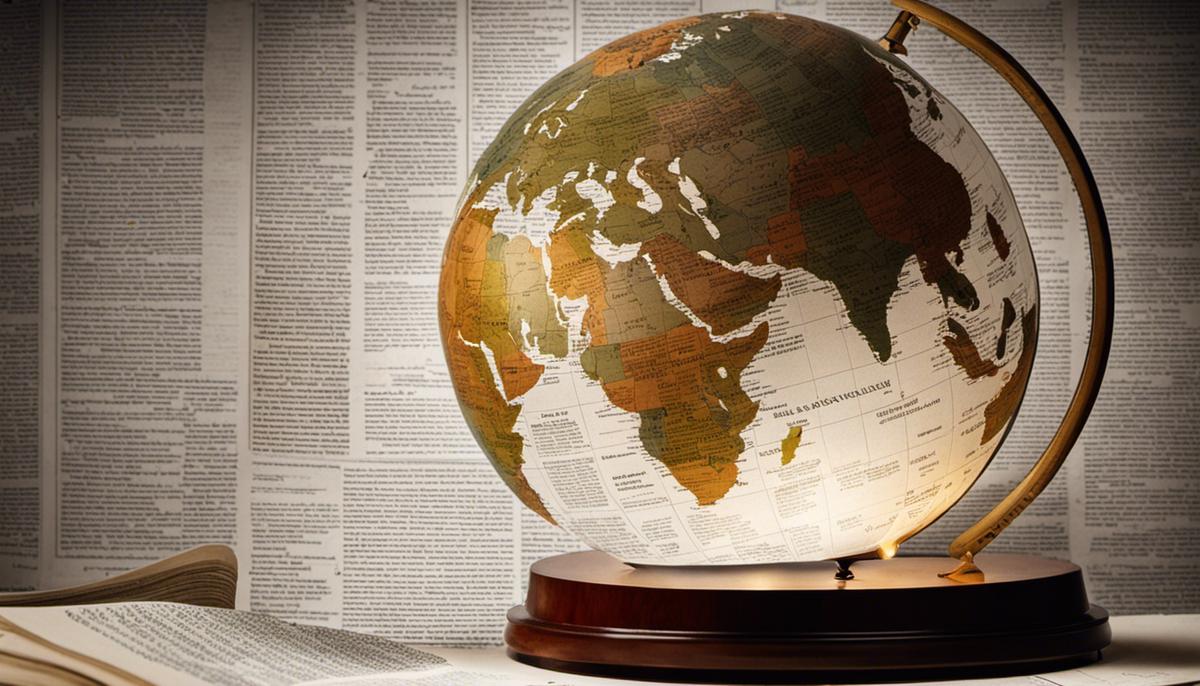Media objectivity and journalistic ethics play an instrumental role in shaping the perception and understanding of the world around us. Throughout the course of history, these two concepts have influenced the overall credibility, integrity, and impact of journalism on a global scale. From its very definition to the trajectory of development over the years, media objectivity is rooted in a broader socio-political and cultural context. Moreover, inherent to the provision of relevant, unbiased, and accurate information, rests the ethical principles journalists are expected to uphold. As we delve into an exhaustive analysis of these subjects, we unravel the complexities and challenges marring today’s media landscape, from fake news to commercial pressures and how these global differences impact international dialogues.
Table of Contents
Definition and History of Media Objectivity
The Evolution and Implications of Media Objectivity: An Analytical Perspective
Media objectivity, in essence, refers to the expression of news and information devoid of personal biases, prejudices, and preferences. It stems from the cardinal principle of journalistic neutrality, which mandates the comprehensive coverage of news in an impartial and balanced manner. Primacy of fact, fairness in reporting, covering diverse perspectives, and disassociation from any personal or institutional bias are fundamental to media objectivity.
Tracing the origins of media objectivity requires casting a glance back to the 19th century. During this era, American journalism embraced a partisan approach, with newspapers predominantly controlled by political parties. However, the advent of the 20th century brought with it a transformation, catalyzed by the rise of commercial newspapers imbued by principles of fair and balanced reporting.
Although maintaining absolute neutrality is inherently challenging for any human undertaking due to intrinsic biases, media objectivity was seen as the paragon of virtue in journalism. This ethos was dominant until the latter half of the 20th century. An important turning point came with the emergence of the ‘New Journalism’ movement of the 1960s and 1970s, characterized by emotive, narrative-driven reporting that often reflected a reporter’s own perspective.
In the early 21st century, the explosion of digital media platforms fractured the media landscape further. The newfound ease of publishing unlocked the gates to a wave of subjective reporting. Blogs, vlogs, podcasts, social media influencers – these platforms often trump traditional norms of objectivity in favor of an intimate, personal style that resonates with the audience’s emotions and beliefs.
Simultaneously, however, the advancement of data journalism proposes a return to the original roots of media objectivity. By leveraging algorithms and big data to analyze, interpret and present news, it aims to eliminate human bias, creating a new dimension of objectivity.
The evolution of media objectivity has profound implications for society. While subjective media can build more intimate relationships with the audience, it can enhance polarization and breed misinformation. Conversely, steadfast adherence to objectivity can foster a superficial understanding of issues by restricting in-depth exploration of perspectives.
Media objectivity constitutes an invisible yet forceful current that shapes people’s perceptions, influences policy-making, and constantly redesigns societal landscapes. The task for the 21st-century journalist, therefore, is to navigate the fine line between staying true to the ethos of objective reporting while engaging an audience increasingly accustomed to a subjective media palette.
While the debate over media objectivity will persist, its core principle, the commitment to truth, enduring amidst the labyrinth of evolving media practices, remains vital more than ever before in these uncertain times. As the media landscape continues to evolve, so too will the methods to anticipate, analyze and address the challenges of achieving media objectivity.

The Role of Journalism Ethics
Shifting gears now, we delve into the crucial aspect of ethics as guiding lights in the journalistic profession. It is hard to separate the two; unsurprisingly, journalism and ethics are deeply intertwined, underlying the very fabric of this noble profession.
Ethics in journalism are a set of norms and guidelines that govern journalists’ behavior. Notably, these guidelines not just dictate the “how to,” but also provide guidance on “what not to” when it comes to reporting, thus forming an invisible yet robust fence that helps establish the boundaries of professional conduct.
Delve into the unique landscape of ethics in journalism, and “truth” inevitably surfaces as the core tenet. Journalists swear by this principle, treating truth as sacrosanct, making it their quest to illuminate even the most obscure corners with this potent weapon. A fundamental compass in this noble pursuit is the duty to verify. Journalists are expected to examine and corroborate information before broadcasting, ensuring accuracy over speed or salaciousness.
The commitment to fairness is another guiding beacon of journalistic ethics. Journalists must present diverse perspectives without favor or prejudice, giving a voice to the voiceless, underpinning the essence of nuance and fairness in reporting.
Integral to this code of ethics is the independence property. Journalists are its guardians. It is their duty to maintain autonomy from those whom they cover, thereby minimizing conflicts of interest, real or perceived. Unwavering even in the face of considerable pressure, this resolve reinforces the journalistic commitment to unbiased reporting.
The practice of minimizing harm forms another significant branch of journalistic ethics. Striving to understand the potential consequences of their reporting, journalists endeavor to treat all subjects with respect, eschewing the unnecessary invasion of privacy or exploitation of someone’s misfortune.
However, this ethical framework is not without its struggles—a context inextricably linked with the digital era’s birth. As information becomes increasingly democratized, the task of establishing ethical norms becomes more challenging and complex. There is a pressing need for journalists to remain firmly anchored to ethical guidelines, even as they navigate these uncharted waters.
Privacy has seen new concerns with the explosion of accessible personal data. Balancing public interest with an individual’s right to privacy, negotiating this interface is an increasingly urgent ethical question.
Furthermore, the burgeoning social media platforms with their potent reach pose ethical challenges. Here, the journalist’s role is evolving from a single-source truth-teller to a curator of information, sifting through the noise to present the truth. This transition demands an interpretation of ethics that might be different, yet in essence, remains the same.
Indeed, journalistic ethics have undergone transformation, much like the profession itself. However, their centrality in guiding the journalistic profession remains unshaken, bridging the chasm between the power of the truth and its potential for harm.
The seamless incorporation of ethics into journalistic activities is no small feat. It is a testament to the profession’s enduring strength, instilling faith in its purpose despite the challenges posed by evolving mechanisms of information dissemination.
In conclusion, journalism, at its core, is about delivering factual information with truth, fairness, and independence, while minimizing harm. Despite the changing landscape, it resonates that the guiding star of this profession remains ethics, unflinching and consistent, underscoring the power of journalism in shaping informed societies.

Challenges to Media Objectivity
Contemporary challenges confronting media objectivity extend beyond a mere deviation from relaying information detached from personal views.
As we further delve into the current challenges, it’s crucial to unpack the inherent link between journalism and ethics.
The crux of journalism firmly rests on ethics, underscoring an unwavering commitment to truth. This core tenet presents the obligation of truth, both as a moral framework and as an operational principle. Journalists are expected not just to communicate facts, but to provide accurate and contextual truths. True objectivity, therefore, challenges the media to interpret factual information, serving their audiences not just an array of data, but refined conclusions grounded on verifiable facts.
Verification challenges hover over the media landscape now more than ever. Faced with an onslaught of information made accessible by the digital age, the media grapples with separating facts from fiction. It isn’t enough to simply report – the industry must also verify. Misinformation stands as a considerable hurdle for media objectivity, transforming the media’s role: not just storytellers but discerning curators of truth.
The obligation of fairness furthers the complexity of navigating media objectivity. To present diverse perspectives is not about giving equal weight to all sides, but bringing forth previously marginalized voices without succumbing to the false balance fallacy. It’s a precarious endeavor, especially considering the potential to inadvertently provide unwarranted validation to unfounded views.
Independence, another pillar of journalistic ethics, seemingly opposes the commercial nature of media outlets. In a capitalist market, the media’s reliance on advertising revenue can compromise their independence, leaving their objectivity at the mercy of potential conflicts of interest.
To minimize harm – a central journalistic principle – today’s media must navigate ethical minefields more nuanced than in bygone days. The increased accessibility to private information and a public eager to consume exposes the blurred line between what is newsworthy and what might cause unnecessary harm. The digital era’s affordances magnify the potential for reputational damage and infringing on privacy, further challenging objective reporting.
In confronting this infinite stream of data, contemporary journalists bear the responsibility of being gatekeepers to a tsunami of often conflicting information. Armed with digital tools and the enduring strength of the principles of journalism, their objective is the same: to present factual information with truth, fairness, independence, and minimal harm, navigating dilemmas presented by today’s interconnected world.
To conclude, the struggle for media objectivity is a testament to Journalism’s strength, rooted in ethical principles that have remained remarkably constant despite the transformations it has experienced. Contemporary challenges threaten to undermine and compromise these principles, pressuring the journalistic sphere to continuously adapt, innovate and retain the vital role it plays in society.

Global Comparisons and Impacts
Building upon these foundations, it is crucial to probe into the global comparison of media objectivity and journalistic ethics, commencing with a geographical overview.
The freedom and objectivity in media are correlated with the state of democracy and freedom of speech in different countries. For instance, countries scoring high in the Freedom House’s Freedom in the World report, such as Norway, Sweden and Finland, also rank high in press freedom.
Taking a closer examination, European countries, driven by robust regulatory structures and commitment to press freedom, set a high standard for media objectivity and journalism ethics. They typically have independent press councils to handle complaints, bolster press accountability, and reinforce high ethical standards.
Conversely, in more autocratic regimes, media objectivity is frequently compromised under political control and censorship. In such environments, the role of journalism shifts significantly, sometimes becoming a mouthpiece for the government. A common falsification method is ‘propaganda of facts’, where the government selectively reports events that encourage a particular narrative.
Undeniably, challenges to media objectivity and ethical journalism are not confined to any single geographical locale. The advent of digital media has global ramifications, with the spread of misinformation and ‘fake news’ now a worldwide scourge. It is incumbent upon all journalists, irrespective of region, to engage in rigorous fact-checking and verification processes.
Global media giants originating from democratic societies also face dilemmas. Their expanding reach often leads them to environments where freedom of speech is scarcely observed. Here, they negotiate a complex terrain while striving to uphold their core principles of objectivity and ethics.
Furthermore, the pluralistic platform offered by the digital space, while extending reach and diversity, also presents new ethical considerations. These include questions of digital representation, algorithmic bias, and digital privacy, themes universally contentious and subject to varied legislations.
Turning the lens towards the Global South, the challenges are multifaceted and deep-rooted. In regions such as Sub-Saharan Africa and parts of Asia, the main hurdles consist of systemic corruption, limited resources, and inadequate training for journalists. Yet, many in these regions continue to be beacon-bearers of ethical journalism, demonstrating resilience in the face of adversity.
Lastly, journalism education worldwide plays an indispensable role in instilling ethical standards. There are grounds for optimism as journalism schools globally incorporate ethics into their curriculum, fostering the next generation’s commitment to truthfulness, accuracy, and independence.
In conclusion, the status of media objectivity and journalism ethics essentially echoes the democratic health of societies worldwide. Whether in the bastions of press freedom in the North or in the challenging terrains of the Global South, the universal principles of truth, fairness, independence and minimizing harm continue to guide journalists. The tenacity of these ideals forms the backstop against rising tides of misinformation and partisanship, asserting the enduring power and relevance of ethical journalism in a global context.

Future Outlook and Solutions
A keen examination of media objectivity and journalism ethics manifests a strong correlation with the practice of democracy and freedom of speech. In the global arena, we notice a brilliant display of this principle in leading European countries. They provide robust regulatory structures for their journalism, as well as press freedom. These countries serve as a testament to the fact that a strong regulatory framework not only supports the exercise of journalism ethics and media objectivity but also supplements the thriving democratic tenets.
Contrastingly, the state of the media in autocratic regimes offers the flipside of this coin, where media objectivity is constantly compromised. Oftentimes, the government controls and restricts the media, underpinning the narrative that the freedom of speech and the media’s ability to uphold its objective stand are inseparable.
The digital age however, presents a new challenge – misinformation and fake news. The proliferation of ‘clickbait’ articles and misleading news stories compromise the professional and ethical standards of journalism, with the potential to sway public opinion on a broad scale.
As we delve deeper, we discern the dilemmas faced by global media giants operating in regions with limited freedom of speech. In these circumstances, the conundrum of balancing business interest while maintaining ethical journalism standards is palpable. In such scenarios, the media’s dedication to integrity and truth puts their business prospects at risk, underscoring the complexity of the situation.
In the digital space, challenges such as algorithmic bias and digital privacy issues mar the practice of ethical journalism. Algorithmic bias presents the risk of creating echo-chambers, limiting the exposure to a diversity of views and ideas. Digital privacy concerns hamper the public’s trust in media, further complicating the media’s commitment to trustworthy and ethical practices.
Furthermore, journalists in the Global South face an uphill battle due to rampant corruption, limited resources, and inadequate training. These factors pose an immense challenge in maintaining objectivity in their reports and adhering to journalism ethics.
Education enters the scene as a useful tool to uphold the ethical standards in journalism. Journalism education serves a vital role in instilling these standards in future journalists. It emphasizes the critical need for journalists to practice truth-telling, fairness, independence, and minimizing harm in their profession.
In conclusion, the enduring strength of the principles of journalism and media objectivity continues to serve our society in the face of contemporary challenges. The universal principles of truth, fairness, independence, and minimizing harm remain integral components of ethical journalism. In the future, continuous adaptation and consistent reinforcement of these principles are essential to navigate the evolving landscape of the media industry.

Looking ahead, the media landscape continues to be reshaped by evolving challenges and technological advances. As these changes take place, the cardinal principle of media objectivity and commitment to journalism ethics must remain in the forefront. Amid all complexities, there are myriad of opportunities and strategies that could be employed to safeguard these essential principles. Whether it’s through exploring the potential role of emerging technologies, advocating for regulatory changes, or emphasizing the importance of journalism education, the path to ensuring ethical journalism must be navigated with perseverance, foresight and integrity. Through this multi-dimensional exploration, we realize that preserving and advancing the integrity and objectivity of journalism is not only critical but also possible, thus shedding a positive light on the future of journalism.

Matt Smith is a seasoned journalist and author whose expertise spans across the dynamic realms of Politics, Gadgets, Gaming, and a plethora of general interest topics. With a Master’s in Political science and tech pedigree shaped in Silicon Valley, Matt brings a wealth of knowledge and a critical eye to everything he writes.
Politics: Matt offers sharp political commentary, drawing from his experience as a political analyst and his academic rigor.
Gadgets: His tech insights are grounded in real-world experience, having been on the front lines of innovation with a degree from Caltech.
Gaming: A respected voice in gaming, Matt’s reviews and trend analyses are a testament to his deep involvement in the gaming community.
General Topics: From science to culture, Matt’s writing spans a broad spectrum, engaging readers with a blend of expertise and relatable prose.
Engage with Matt’s compelling content for a fresh perspective on the issues at the forefront of today’s discourse.

